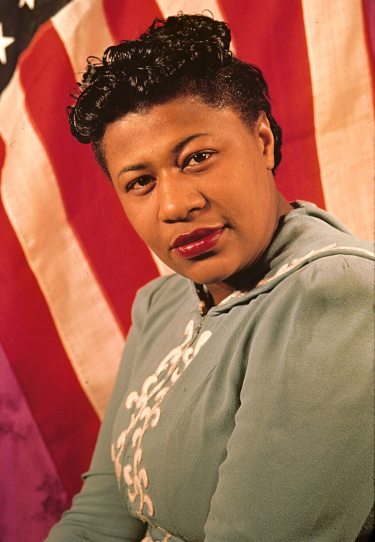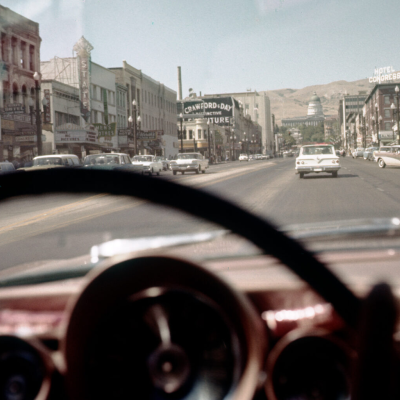My first experience with records was an Edison cylinder phonograph (spring wound) that my dad bought second hand around 1930. We had about ten cylinders with music like “The Swan,” played on a cello, “Followin’ in Father’s Footsteps” by Sir Harry Lauder, and some vaudeville songs like “With His Hands In His Pockets and His Pockets In His Pants (He Gets A Little Wiser Every Day).” I first heard 78s at a friend’s house, and marveled at the improvement in technology that allowed two songs to be sold on one record! My grade school music teacher called me into his house as I passed by one day, and played Louis Armstrong’s “West End Blues” for me. I was learning the trumpet, and he thought I should hear Louis.
As soon as I began earning after-school money, I headed for the local electric store (Kirkland, Washington, my home town) which had, in a corner behind the stoves and refrigerators, a small record player and a shelf of records to choose from. You could stand there for hours and listen to the records as long as you bought at least one. They didn’t have “West End Blues,” but they did have Louis and Jack Teagarden as the guest stars on an album with Glenn Gray and the Casa Loma Orchestra. I bought the album and memorized the music. I also bought a tiny bakelite turntable with lead wires that I connected to our table radio at home, and a pack of cacti needles that were said to cause less wear on the grooves of the records. The needles came with a little rotary sharpener, and had to have their points dressed after every few plays. I was fortunate that my electric store stocked a variety of jazz labels.
Besides the popular bands on the major labels: Goodman, Ellington, Shaw, Dorsey, Harry James, The Ink Spots, Fats Waller, Nat Cole, there were smaller labels that introduced me to Mary Lou Williams, Eddie Miller, Johnny Hodges’s small groups, the Chocolate Dandies, Benny Carter, Dodo Marmarosa, Eddie Condon, Private Cecil Grant, Saunders King, Edmund Hall, Pinetop Smith. By the time I left high school, I had many apple boxes full of 78s, and when I left college to come to New York in 1950, I gave away most of my collection to friends.
_________
The Casa Loma Orchestra
*
The very first jazz record I ever had was purchased in New York. My dad and I were shopping for a record player, and in the shop we came across a twelve inch record called “Tenors Wild and Mild” And guess who was featured on it??? Eddie Lockjaw Davis, and it killed me…raunchy, and unbelievably swinging! It was on the Pontiac Label.
_________
Eddie “Lockjaw” Davis
*
I Surrender Dear
____________________________________________________________________________
The first album I bought as a kid was Woodchoppers Ball, a compilation of music by Woody Herman’s Thundering Heard from the mid 1940’s. I think I was around 12 years old at the time, and I can’t remember exactly why I picked that Lp over the other music I was hearing at home at the time. In retrospect, when I listen to cuts like Apple Honey, The Good Earth, Your Father’s Moustache, Wild Root, Non-Alcoholic, and The Goof and I, it seems like it was a damn good call — a great band driven by a fantastic drummer (Dave Tough), great improvisers (Stan Getz, Serge Chaloff, Bill Harris), working with great arrangements (Ralph Burn, Neil Hefti). All of these elements are the primary factors I consider while developing my own music today.
_________
Everyone in my family was crazy about music. I was the youngest and it was a foregone conclusion that one day, following the example of my two older sisters and father, I’d too be buying records of my own choosing. And when that day finally came, my mother took me in the car to a record store on route 22 in Union, NJ. Even now, more than 40 years later, the mere mention of it’s alliterative name spells excitement, wonder, magic — “Harmony Hut”.
I’m not sure if it was the very first record I ever bought, but it was undoubtedly among the first. And if you’re thinking along the lines of Bird at Massey Hall, Monk at the Five Spot, Clifford and Max at Basin Street, well, I hate to disappoint you. It was around 1963, I must have been seven or eight, and the record was by my idol of the day, Soupy Sales, Spy With A Pie. Of course I remember the title track, but also other tracks, like “Soupy of the Secret Service”, “When I See a Pie in the Sky”, and the exceptional “Vy You Spyvink on Me?”. I literally wore this record out.
As for my first jazz record, again I can’t say positively which was the very first. But I do recollect that it was bought at a tiny record store (I don’t remember the name) in downtown Linden, NJ (where I grew up) just down from the train station. It might have been a Wes Montgomery compilation on Riverside entitled Wes Montgomery, March 6 1925 – June 15, 1968 which included the phenomenal “Body and Soul,” “I’m A Lucky So And So,” “Remember,” and a solo rendition of “While We’re Young,” as well as “Cottontail.” This time it was my mother who took the record over and it was she who literally wore it out. I remember coming home from school every day and hearing Wes turned up loud and echoing throughout the house. I may not have appreciated Wes’s playing at first hearing — I wasn’t a guitar player yet — but I picked up on his music by osmosis over time, and largely thanks to my mom.
But if the Wes recording was not, in fact, my first jazz record, then it had to have been a Sonny Stitt recording with Jack McDuff (who I later would record with), recorded by Rudy Van Gelder (who would later record nine of my own dates) on Prestige entitled “‘Nuthin Further,” which immediately fascinated me — the feel, the sound, the swing, the dark blue tinted cover photo of Sonny Stitt wearing his shades and holding his tenor. I’ll never forget “Time After Time,” “All of Me,” “When Sonny Gets Blue,” and at least one blues.
These were the first of many many jazz (and other) recordings I have purchased over the years all over the world. In those days I didn’t feel I had really listened to a record until I knew absolutely every note played by every musician on every track by heart. But that came pretty naturally to me — after the first hundred or so listenings.
_________
Sonny Stitt
*








































Love this article. Not “knowing” any of these jazz musicians personally, it is interesting to hear their thoughts. Another interesting question would be, what was your first live music experience?
i was 13 years old, a kid in Los Angeles, accompanying my parents to a discount store called ‘White Front’ in the San Fernando valley. walking the aisles, I came to the music dept., and an album cover caught my eye: Crescent, with a picture of John Coltrane on the album cover. bought it, listened to it on my modest,basic,but serviceable stereo system at home, and have been hooked on jazz ever since.
Fred, that is impressive. I mean Crescent isn’t exactly an “intro to jazz” title. But, hey it worked. I remember White Front in San DIego where I grew up, early model for Target I guess. I believe my first jazz LP was Return to Forever’s “Hymn of the Seventh Galaxy”. My older cousin to me at age 16 (1974) to see them live at The Mainpoint, a small club in Philly. I never looked back.
My first jazz album was hardly unusual — “Kind of Blue” — but I bought it after hearing it being played in the record store…Blew me away…I took it to the counter with a Beatles album and I think an Elton John album (may have been his first). That visit to the record shop in Berkeley — Leopold’s circa 1970 — changed my life.